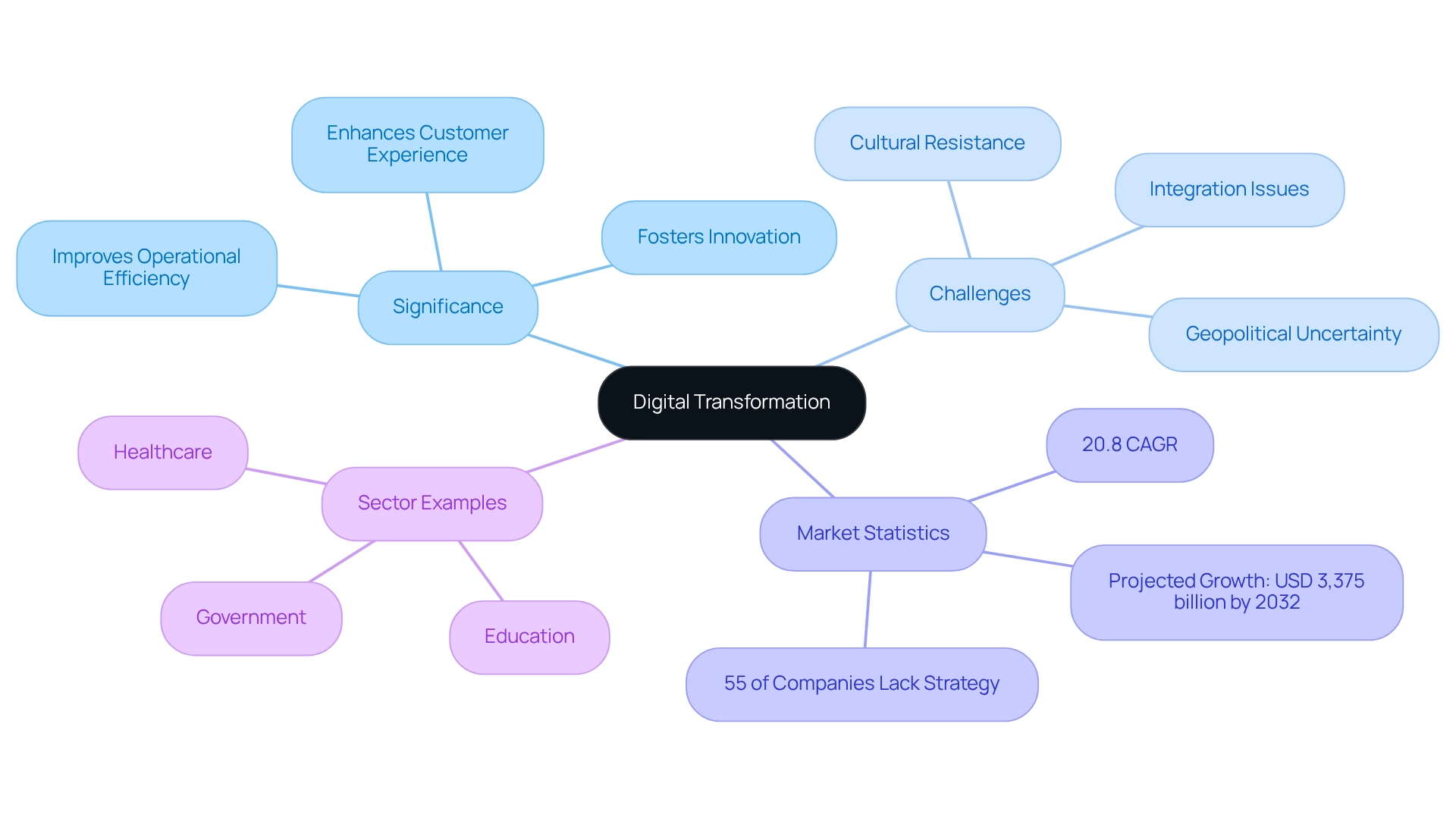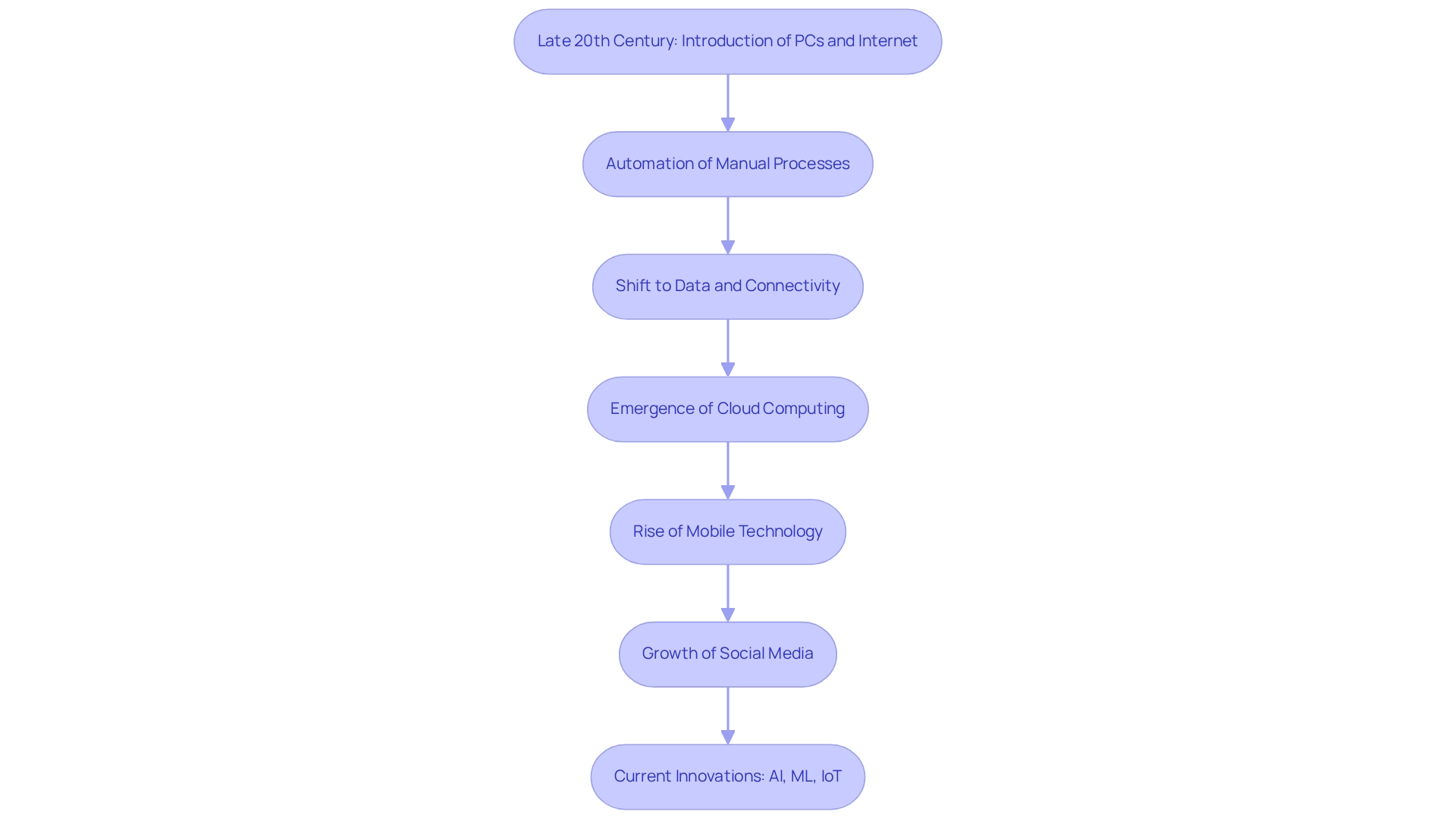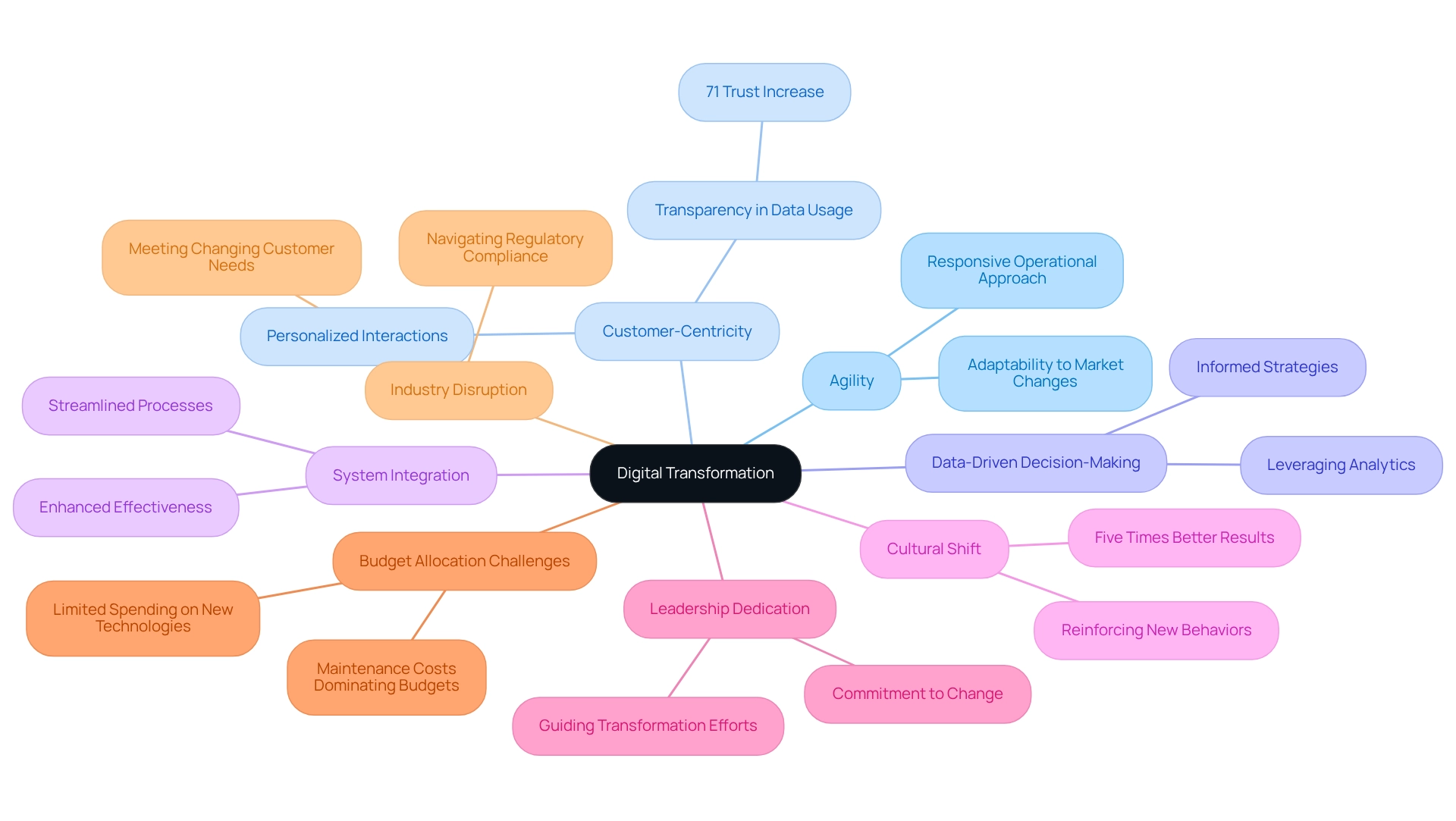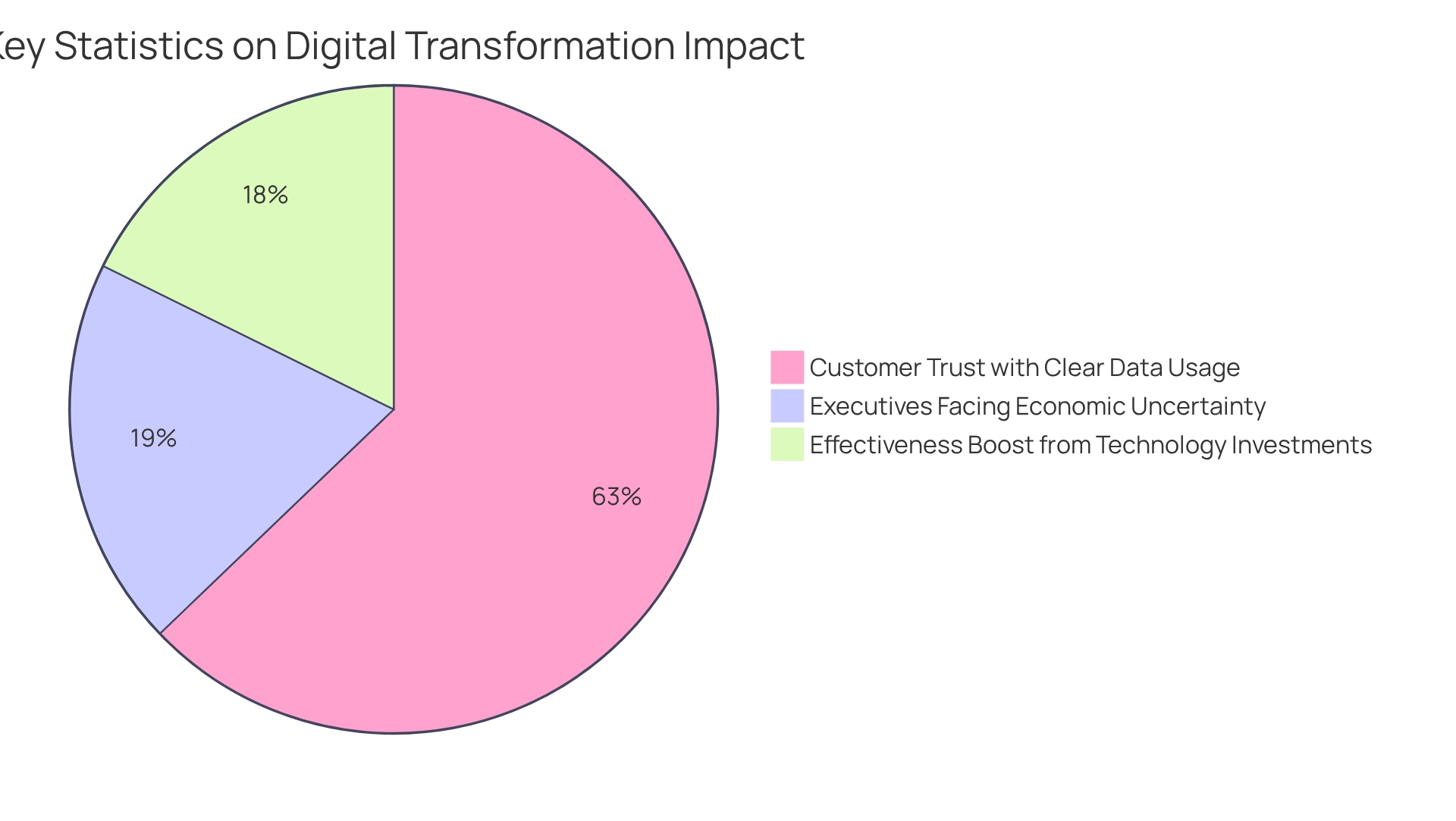Overview
Digital transformation is essential for businesses today. It not only enhances operational efficiency but also significantly improves customer experiences, allowing us to remain competitive in a rapidly evolving market. Companies that lack a technological advancement strategy risk losing market share. Conversely, those that embrace digital transformation can achieve remarkable improvements in responsiveness and innovation through the integration of advanced technologies.
What’s holding your team back from seizing these opportunities? We understand that navigating this landscape can be complex, but the benefits are undeniable. By integrating digital solutions, we can streamline operations and elevate customer satisfaction. As a result, our organizations can adapt swiftly to market changes and innovate continuously.
We encourage you to take action now. Embrace digital transformation and position your business for future success. Together, we can harness the power of technology to drive growth and maintain our competitive edge.
Introduction
In today’s fast-paced business environment, we recognize that digital transformation is not merely an option but a vital strategy for organizations aiming to excel amidst constant change. This thorough integration of digital technologies reshapes our operations and significantly enhances the value we deliver to our customers, making it essential for maintaining a competitive edge. As we navigate the complexities of this transformation, we must foster a cultural shift that promotes innovation, agility, and data-driven decision-making.
With the global digital transformation market poised for remarkable growth, it is imperative for us to understand its significance, origins, and key characteristics. This knowledge will empower us to navigate the challenges ahead and seize the opportunities presented by this digital revolution.
What’s holding your team back from embracing this change?
Define Digital Transformation and Its Significance
The transition to electronic methods is not just a trend; it is a fundamental shift that reshapes operations and enhances value delivery to customers. We recognize that this evolution goes beyond mere technology adoption; it demands a cultural transformation where we actively challenge the status quo, embrace experimentation, and learn from our failures. The significance of this electronic evolution highlights what is the importance of digital transformation, as it has the capacity to markedly improve operational efficiency and elevate customer experiences, fostering the innovation essential for maintaining competitiveness in an ever-evolving market. At Avato, named after the Hungarian term for ‘dedication,’ we are a team of enterprise architects committed to simplifying the unification of diverse systems. Through our dedicated hybrid integration platform, we play a pivotal role in this transformation by enhancing business value. By collaborating with managed service providers globally, we empower organizations to accelerate their technological advancement efforts, ensuring they are equipped to meet contemporary expectations while seamlessly connecting legacy systems with state-of-the-art solutions.
Statistics reveal that 55% of companies lacking a technological advancement strategy, as noted by Amy Danise, anticipate losing market share within a year. This highlights what is the importance of digital transformation for businesses to adapt. Moreover, the global electronic evolution market is projected to reach USD 3,375 billion by 2032, growing at a compound annual growth rate of 20.8%. This growth is driven by advancements in technologies such as Big Data Analytics, AI, and cloud services—vital tools for organizations aiming to innovate and expand.
However, many organizations face hurdles in embracing technological change, including a resistant company culture that can stifle progress. Our services at Avato directly address these challenges by providing tailored solutions that facilitate smoother transitions and integrations. For instance, organizations in sectors like education, government, and healthcare are leveraging technological advancements to enhance operational efficiency. Companies that have adopted a multi-cloud strategy have reported significant improvements in their responsiveness to market demands and customer needs. As the landscape evolves, understanding what is the importance of digital transformation becomes increasingly apparent, marking it as a critical factor for businesses in 2025 and beyond.

Trace the Origins and Evolution of Digital Transformation
The landscape of technological transformation is not just evolving; it is revolutionizing the way we do business. The late 20th century marked the dawn of this shift, with the introduction of personal computers and the internet. Initially, companies leveraged electronic tools primarily to automate manual processes. However, as advancements progressed, we saw a pivotal shift towards harnessing data and connectivity to drive strategic initiatives. The emergence of cloud computing, mobile technology, and social media has accelerated this evolution, allowing us to enhance customer interactions and streamline operations.
Today, we are witnessing a broad spectrum of innovations, including artificial intelligence, machine learning, and the Internet of Things (IoT). This evolution represents a comprehensive approach to modernizing business practices, with IoT revenue projected to reach 1.6 trillion U.S. dollars by 2030. This statistic underscores what is the importance of digital transformation, highlighting the growing role of interconnected devices in driving business innovation. This regional analysis reveals where the majority of investments are concentrated, highlighting market trends and the pressing need for organizations—especially in the banking sector—to adapt and invest in effective tools and strategies.
Despite this momentum, nearly 45% of executives express concerns that their organizations lack the necessary tools for successful technological transformation. This emphasizes the critical need for continuous tracking and feedback to refine our strategies, illustrating what is the importance of digital transformation for businesses that aim to stay competitive in a rapidly changing landscape. The recent surge in the application of generative AI within financial services—evidenced by a 60% increase in its use for enhancing customer experience—demonstrates its potential to transform customer engagement through advanced chatbots and virtual assistants.
As we leverage cloud computing and mobile technology, we are not only enhancing our operational capabilities but also positioning ourselves for future growth in an increasingly digital world, highlighting what is the importance of digital transformation. This evolution is particularly beneficial for sectors such as banking, where the secure and efficient unification of systems is crucial. Our dedicated hybrid unification platform simplifies disparate systems, enabling financial institutions to unlock isolated assets and enhance business value, ultimately empowering them to lead the AI revolution.

Identify Key Characteristics and Components of Digital Transformation
In today’s dynamic landscape, organizations must recognize what is the importance of digital transformation, as digital change is no longer optional but imperative for thriving. Key characteristics such as agility, customer-centricity, and data-driven decision-making are essential. We must swiftly adapt to evolving market conditions and customer preferences, necessitating a flexible operational approach. A strong emphasis on customer experience is crucial because we aim to meet and exceed expectations through personalized interactions. In fact, 71% of clients express greater confidence in businesses that clearly outline how their personal information is used, underscoring the significance of transparency in our client relations.
As we prepare for open banking, the incorporation of advancements becomes even more critical. Data-driven decision-making is central to this transformation, enabling us to leverage analytics for informed strategies and optimized processes. This ensures our responsiveness to emerging trends and enhances overall effectiveness. Understanding what is the importance of digital transformation also hinges on essential elements such as system integration, cultural shift, and leadership dedication. Organizations that focus on cultural change have achieved results five times more remarkable than their peers, illustrating the profound impact of reinforcing new organizational behaviors.
Moreover, case studies indicate that IT departments often allocate a mere fraction of their budgets to new technologies, with maintenance consuming the majority of spending. This budget limitation poses challenges for organizations aiming to innovate and implement effective digital development strategies, particularly in the banking sector, where regulatory compliance and security are paramount. The pressure of industry disruption and the need to meet changing customer needs further complicate these challenges. However, those of us who prioritize agility and customer-centricity, while ensuring our integration solutions comply with stringent security protocols, can navigate these obstacles more effectively, positioning ourselves for success in a rapidly changing landscape.

Examine the Impact of Digital Transformation on Business Operations
Understanding what is the importance of digital transformation is crucial as it profoundly reshapes business operations. We streamline processes, enhance collaboration, and drive overall efficiency. Organizations that adopt automation solutions can significantly minimize manual tasks, leading to quicker turnaround times and a marked reduction in operational expenses. For instance, firms employing comprehensive frameworks such as OKRs to assess technology investments have demonstrated significant outcomes in their technological advancement initiatives, achieving a 20% boost in effectiveness.
Furthermore, technological tools enhance communication and cooperation among teams, successfully breaking down silos and encouraging a more unified work environment. However, data and cybersecurity challenges complicate the secure and efficient use of information in changes, which is a crucial factor for banking institutions. The capacity to analyze data in real-time empowers businesses to make swift, informed decisions, adapt to market fluctuations, and continuously innovate. In fact, 22% of executives recognize economic uncertainty as a significant challenge to executing technological transformations, emphasizing the necessity for agile responses. Moreover, 71% of customers are more inclined to trust a company with their personal information if its usage is clearly outlined, underscoring the significance of openness in digital efforts.
Avato plays a crucial role in this environment by offering a specialized hybrid connection platform that streamlines complicated linkages and improves operational visibility. The name Avato, originating from the Hungarian term for ‘dedication,’ signifies our commitment to designing the infrastructure needed to enable rich, connected customer experiences. Relied upon by banks, healthcare, and government sectors, we speed up the unification of isolated systems and fragmented data, providing the connected foundation enterprises require to modernize. With backing for 12 stages of interface maturity, we enable organizations to balance the pace of assimilation with the refinement necessary to safeguard their systems, highlighting what is the importance of digital transformation. Ultimately, firms that embrace this concept are strategically placed to thrive in a competitive environment, as they can more efficiently address customer demands and shifting market dynamics. With 81% of telecom survey respondents believing that IoT can enhance urban management, the potential for digital transformation to drive efficiency and collaboration is clear. As organizations continue to navigate the complexities of modern business, the integration of automation technologies, supported by Avato’s robust platform, will be crucial in streamlining processes and enhancing operational capabilities.

Conclusion
Digital transformation is not just a strategy; it is an imperative for organizations striving to excel in an increasingly competitive landscape. We understand that it encompasses the comprehensive integration of digital technologies, reshaping operations and enhancing the value we deliver to our customers. This transformation necessitates a cultural shift that fosters innovation, agility, and data-driven decision-making—qualities essential for adapting to the rapid changes in market dynamics.
The evolution of digital transformation has been propelled by significant technological advancements, including the rise of artificial intelligence, cloud computing, and the Internet of Things. These innovations empower us to improve customer engagement and optimize operations, all while addressing the barriers that can hinder our progress. Companies that embrace a digital transformation strategy find themselves better positioned to respond to customer needs and drive efficiency.
Moreover, the characteristics of successful digital transformation—such as agility, customer-centricity, and leadership commitment—are crucial for navigating the complexities of modern business. By prioritizing these traits, we can achieve remarkable results, positioning ourselves to lead in our respective industries. The integration of automation technologies further streamlines our processes and enhances collaboration, enabling us to make informed decisions swiftly.
In conclusion, the necessity for digital transformation cannot be overstated. As the global market continues to evolve, we must embrace this revolution not just to survive but to thrive. By overcoming cultural resistance and leveraging advanced technologies, we can unlock new opportunities and enhance our operational capabilities. The time to act is now; the future of our business hinges on our ability to adapt and innovate in the face of digital transformation.

